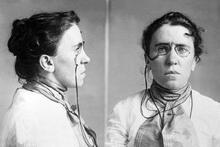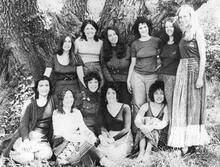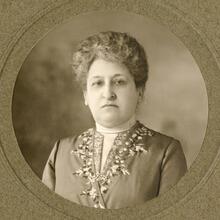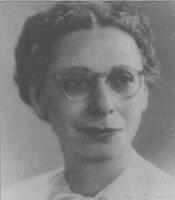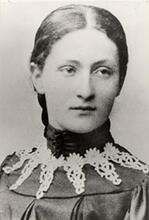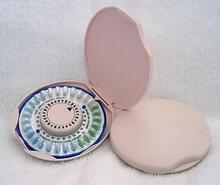Marie Pichel Levinson Warner
Born in 1895 in Ohio, doctor Marie Pichel Warner worked for the birth control movement in the United States. Among Warner’s many positions, she founded the birth control clinic at the Recreation Rooms Settlement House in Manhattan in the 1930s; in 1940, she became medical director there. She served as medical director of contraceptive clinics at New York City’s Jewish Memorial Hospital. Recognizing the value of the nonprint media, Warner gave talks about birth control over radio station WEVD and produced a film on the subject in the 1930s. She took the cause to the road and traveled throughout the United States, lecturing and visiting other clinics. In addition to these activities, she ran a private practice and published articles and books on contraception and infertility.
Family and Education
“Contraception is a health problem of importance to the patient and to the physician and involves the welfare of not only the individual but also of society,” concluded Marie Pichel Warner in a 1940 article in the Journal of the American Medical Association. Warner pursued that health problem, as well as infertility, in research and in practice, as assistant medical director at Margaret Sanger’s Clinical Research Bureau from 1927 to 1936, and medical director of the Family Planning Clinic in Harlem (beginning in 1933), run in conjunction with the New York Urban League.
Marie Pichel Levinson Warner was born on June 30, 1895, in Cincinnati, Ohio, one of five children of Isaac and Lily (Loeb) Pichel. She earned a BS from the University of Cincinnati (1919), working as a social investigator at Cincinnati General Hospital (1916–1917) and as a case worker for the American Red Cross (1917–1918). She married Louis J. Levinson in 1922 in Cincinnati and earned an MD from the College of Medicine of the University of Cincinnati the next year. She interned at Deaconess Hospital (1923–1924). After her husband’s untimely death, she moved to the East Coast. In 1933, she married Dr. Benjamin W. Warner. The couple lived in New York City and Scarsdale, New York.
Career
Reflecting the limited employment opportunities for women physicians of the era, she held various positions in education and social service in addition to running a private practice. She served as assistant medical examiner for the University of Cincinnati’s Department of Hygiene (1923–1924); physician for the public schools in New Britain, Connecticut (1924–1926), and in New York City (beginning in 1928); and director and camp physician at Camp Eagle Point and Camp Stimson in Rumney, New Hampshire (1924 to 1932).
The bulk of Warner’s professional commitments focused on the birth control movement. Historian Carole McCann maintains that Sanger chose Warner as medical director of the Harlem clinic because of Warner’s good rapport with its African-American clients. Warner claimed to have founded the birth control clinic at the Recreation Rooms Settlement House in Manhattan in the 1930s; in 1940, she became medical director there. She also served as medical director of contraceptive clinics at New York City’s Jewish Memorial Hospital and as a member of the committee on the prevention of venereal disease of the Bronx Tuberculosis and Health Association, and lectured on the topic at New York University (1934–1936). Recognizing the value of the nonprint media, Warner gave talks about birth control over radio station WEVD, under the auspices of the New York City Young Men’s Christian Association (1933–1936), and produced a film on the subject in the 1930s. She took the cause to the road and traveled throughout the United States, lecturing and visiting other clinics. In 1934, as an American delegate, Warner spoke at the meeting of the International Medical Women’s Association in Stockholm, Sweden.
In addition to these activities, she ran a private practice and published articles and books on contraception and infertility. She also held various assistant or adjunct hospital appointments, at New York City’s Mount Sinai and Jewish Memorial hospitals, for example. Beginning in the early 1950s, Warner was visiting obstetrician at the New York Infirmary of Beth Israel Medical Center. Her professional memberships included the American Medical Association, the New York State Medical Society, and the American Social Hygiene Association. She also belonged to the Alpha Epsilon Iota, Order of the Eastern Star.
Warner maintained a full-time medical practice on Fifth Avenue through the 1960s and 1970s. Ill health finally forced her to retire at age eighty-four, only a few months before she died on November 3, 1979.
Selected Works by Marie Pichel Levinson Warner
Artificial Insemination in Cases of Incurable Sterility (1948).
“Contraception: A Study of Five Hundred Cases from Private Practice.” JAMA 115 (July 27, 1940): 279–285.
The Couple Who Wanted a Baby (1961; Revised edition, 1968, as Modern Fertility Guide).
A Doctor Discusses Breast Feeding, with Miriam Gilbert (1981).
Social Hygiene Problems of Childhood and Family Concerns. (1934).
American Medical Directory (1925–1969).
Cincinnati Medical Heritage Center. University of Cincinnati, Cincinnati, Ohio.
Kopp, Marie E. Birth Control in Practice (1933).
McCann, Carole R. Birth Control Politics in the United States, 1916–1945 (1994).
Obituary. NYTimes, November 5, 1979, D7.
Sanger, Margaret. Collection. Library of Congress, Washington, D.C., and Sophia Smith Archives, Smith College, Northampton, Mass.
WWIAJ (1938): 1104.

